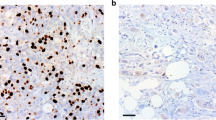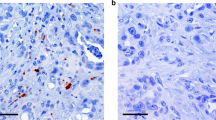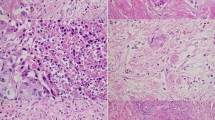Abstract
Background
Adjuvant gemcitabine (aGC) is still a therapeutic mainstay after resection of pancreatic ductal adenocarcinoma (PDAC), but its efficacy is impaired by gram-negative intratumoral bacteria, suggesting a potential therapeutic implication of additive antibiotics. PDAC however, contains several other bacterial strains capable of gemcitabine degradation.
Methods
Using immunohistochemistry and fluorescence-in-situ-hybridization on the samples of a large cohort of resected PDAC patients, we examined how the intratumoral bacterial abundance affected patient outcomes with respect to aGC therapy and whether the use of pre- or postoperative antibiotics (ABT) improved the prognosis. We confirmed the findings in several independent external cohorts.
Results
High intratumoral bacterial abundance impaired aGC efficacy (disease free survival (DFS) 9.4 vs 19.1 months, p < 0.001; overall survival (OS) 19.4 vs 34.0 months, p < 0.001), which was mitigated by postoperative ABT application (DFS 7.9 vs 12.4 months, p < 0.001, OS 15.2 vs 29.6 months, p < 0.001). Postoperative ABT improved outcome of patients with low bacterial abundance in their tumors (DFS 15.1 vs 34.8 months, p < 0.001, OS 28.5 vs 56.00 months, p < 0.001).
Conclusions
High intratumoral bacterial abundance may predict poor response to adjuvant gemcitabine treatment, whereas postoperative ABT improves it. We propose postoperative ABT as potential additive treatment before or during aGC therapy after PDAC resection.

This is a preview of subscription content, access via your institution
Access options
Subscribe to this journal
Receive 24 print issues and online access
269,00 € per year
only 11,21 € per issue
Buy this article
- Purchase on SpringerLink
- Instant access to full article PDF
Prices may be subject to local taxes which are calculated during checkout



Similar content being viewed by others
Data availability
Anonymized raw data on the study can be obtained from the corresponding author upon reasonable request.
References
Guenther M, Boeck S, Heinemann V, Werner J, Engel J, Ormanns S. The impact of adjuvant therapy on outcome in UICC stage I pancreatic cancer. Int J Cancer. 2022;151:914–9.
Park W, Chawla A, O’Reilly EM. Pancreatic cancer: a review. Jama. 2021;326:851–62.
Reni M, Giommoni E, Bergamo F, Milella M, Cavanna L, Di Marco MC, et al. Guideline Application in Real world: multi-Institutional Based survey of Adjuvant and first-Line pancreatic Ductal adenocarcinoma treatment in Italy. Primary analysis of the GARIBALDI survey. ESMO open. 2023;8:100777.
Guenther M, Haas M, Heinemann V, Kruger S, Westphalen CB, von Bergwelt-Baildon M, et al. Bacterial lipopolysaccharide as negative predictor of gemcitabine efficacy in advanced pancreatic cancer–translational results from the AIO-PK0104 Phase 3 study. Br J Cancer. 2020;123:1370–6.
Guenther M, Gil L, Surendran SA, Palm MA, Heinemann V, von Bergwelt-Baildon M, et al. Bacterial lipopolysaccharide as a negative predictor of adjuvant gemcitabine efficacy in pancreatic cancer. JNCI Cancer Spectr. 2022;6:pkac039.
Geller LT, Barzily-Rokni M, Danino T, Jonas OH, Shental N, Nejman D, et al. Potential role of intratumor bacteria in mediating tumor resistance to the chemotherapeutic drug gemcitabine. Science. 2017;357:1156–60.
Fulop DJ, Zylberberg HM, Wu YL, Aronson A, Labiner AJ, Wisnivesky J, et al. Association of antibiotic receipt with survival among patients with metastatic pancreatic ductal adenocarcinoma receiving chemotherapy. JAMA Netw Open. 2023;6:e234254.
Mohindroo C, Hasanov M, Rogers JE, Dong W, Prakash LR, Baydogan S, et al. Antibiotic use influences outcomes in advanced pancreatic adenocarcinoma patients. Cancer Med. 2021;10:5041–50.
Pernthaler J, Glöckner F-O, Schönhuber W, Amann R. Fluorescence in situ hybridization (FISH) with rRNA-targeted oligonucleotide probes. Methods Microbiol. 2001;30:207–26.
Duncan K, Carey-Ewend K, Vaishnava SJGM. Spatial analysis of gut microbiome reveals a distinct ecological niche associated with the mucus layer. Gut Microbes. 2021;13:1874815.
Austin PC, Stuart E. Moving towards best practice when using inverse probability of treatment weighting (IPTW) using the propensity score to estimate causal treatment effects in observational studies. Stat Med. 2015;34:3661–79.
Guenther M, Surendran SA, Steinke LM, Liou I, Palm MA, Heinemann V, et al. The prognostic, predictive and clinicopathological implications of KRT81/HNF1A- and GATA6-based transcriptional subtyping in pancreatic cancer. Biomolecules. 2025;15:426.
Sepich-Poore GD, McDonald D, Kopylova E, Guccione C, Zhu Q, Austin G, et al. Robustness of cancer microbiome signals over a broad range of methodological variation. Oncogene. 2024;43:1127–48.
Guo W, Zhang Y, Guo S, Mei Z, Liao H, Dong H, et al. Tumor microbiome contributes to an aggressive phenotype in the basal-like subtype of pancreatic cancer. Commun Biol. 2021;4:1019.
Riquelme E, Zhang Y, Zhang L, Montiel M, Zoltan M, Dong W, et al. Tumor microbiome diversity and composition influence pancreatic cancer outcomes. Cell. 2019;178:795–806.e12.
Jiang L, Zhang L, Shu Y, Zhang Y, Gao L, Qiu S, et al. Deciphering the role of Enterococcus faecium cytidine deaminase in gemcitabine resistance of gallbladder cancer. J Biol Chem. 2024;300:107171.
Krüger CM, Adam U, Adam T, Kramer A, Heidecke CD, Makowiec F, et al. Bacterobilia in pancreatic surgery-conclusions for perioperative antibiotic prophylaxis. World J Gastroenterol. 2019;25:6238–47.
Klement RJ, Pazienza V. Impact of different types of diet on gut microbiota profiles and cancer prevention and treatment. Medicine. 2019;55:84.
Acknowledgements
We thank A. Sendelhofert and A. Heier for excellent technical assistance.
Author information
Authors and Affiliations
Contributions
Michael Guenther: Conceptualization, data curation, formal analysis, investigation, methodology, project administration, resources, validation, visualization, and writing—review and editing. Sai Agash Surendran: Resources, software, formal analysis, methodology, investigation, validation, visualization, and writing—original draft. Nina Hauer, Florian Fahrenschon, Muhammed Dervis Arslan: Data curation, project administration, resources. Steffen Ormanns: Conceptualization, data curation, formal analysis, investigation, methodology, project administration, resources, supervision, validation, visualization, and writing—original draft, review & editing. The work reported in the article has been performed by the authors, unless clearly specified in the text. All authors reviewed and approved the final version of the article.
Corresponding author
Ethics declarations
Competing interests
The authors declare no competing interests.
Ethical approval and consent to participate
Due to the observation period of our study (2000–2016) and the poor prognosis of the disease, patient informed consent could not be obtained. Considering these circumstances, the ethics committee of the medical faculty of Ludwig-Maximilians-University approved the use of anonymized patient data without obtaining the patients’ informed consent (project 20-081), and the study was carried out according to the Declaration of Helsinki.
Additional information
Publisher’s note Springer Nature remains neutral with regard to jurisdictional claims in published maps and institutional affiliations.
Supplementary information
Rights and permissions
Springer Nature or its licensor (e.g. a society or other partner) holds exclusive rights to this article under a publishing agreement with the author(s) or other rightsholder(s); author self-archiving of the accepted manuscript version of this article is solely governed by the terms of such publishing agreement and applicable law.
About this article
Cite this article
Guenther, M., Surendran, S.A., Hauer, N. et al. Intratumoral bacterial abundance confers poor response to adjuvant gemcitabine in resected pancreatic cancer patients which is mitigated by postoperative antibiotics. Br J Cancer (2025). https://doi.org/10.1038/s41416-025-03078-2
Received:
Revised:
Accepted:
Published:
DOI: https://doi.org/10.1038/s41416-025-03078-2



